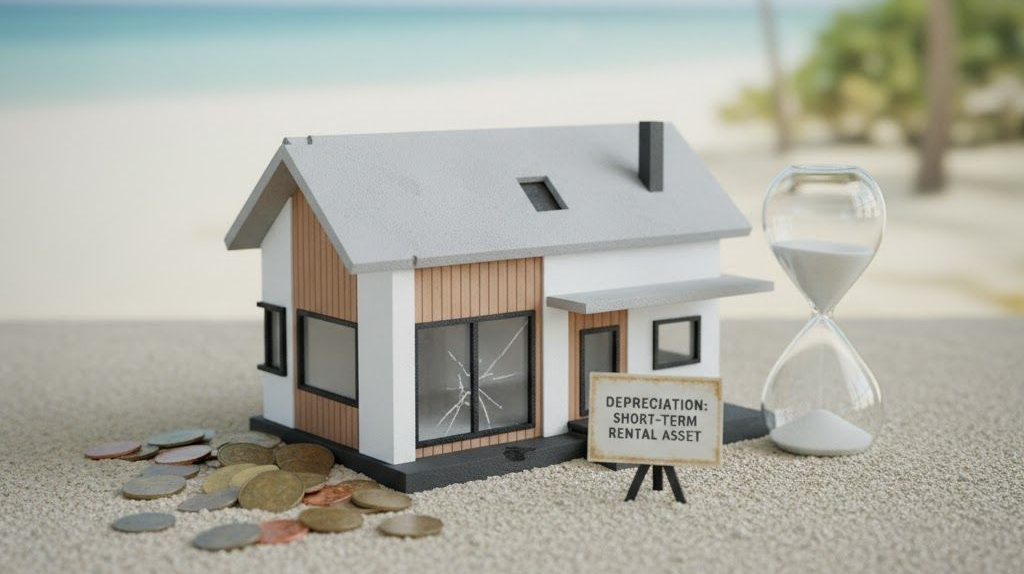Depreciation for Short-Term Rentals: A Smart Guide to Maximize Property Tax Savings
By: Mendandro Paul | Nov 10, 2025

Depreciation for Short-Term Rentals | Tax Guide for Property Owners
Introduction
If you own a short-term rental like an Airbnb or vacation home, knowing how depreciation for short-term rentals works can help you save a lot on taxes. Depreciation lets you deduct part of your property’s value each year, which lowers your taxable income and increases your profits.
In simple terms, it’s a way to get money back over time for the cost of your rental property, and it’s one of the best tax benefits available to property owners.
What Is Depreciation for Short-Term Rentals?
Depreciation means spreading the cost of your property (excluding land) over several years. The IRS allows most residential rental properties to be depreciated over 27.5 years.
For example, if your property is worth $275,000 (excluding land), you can deduct $10,000 each year from your rental income.
Even if your property’s market value increases, you still receive this annual tax benefit. These deductions help offset property expenses such as maintenance, repairs, and upgrades.
Material Participation: How It Affects Your Taxes
To take full advantage of depreciation, property owners must meet the IRS's material participation rules. This means you must be actively involved in running your short-term rental, not just collecting income.
If your average rental period is 7 days or less (or 30 days or less if you offer cleaning or guest services), your property may be treated as an active business. This can give you even more tax benefits, helping offset your expenses while keeping your rental profitable.
Cost Segregation: A Faster Way to Get Deductions
You don’t have to wait 27.5 years to get all your deductions. Through a method called cost segregation, you can separate parts of your property that depreciate faster—like appliances, flooring, lighting, or furniture.
Here’s how it works:
- Furniture and appliances: 5 years
- Landscaping or fencing: 15 years
- Building:
27.5 years
This approach helps you get depreciation deductions sooner, giving you more cash flow to reinvest in your rental property or cover necessary expenses.
Bonus Depreciation: Bigger Deductions Right Away
Bonus depreciation allows you to deduct a large portion of certain improvements in the same year they’re made.
If you buy new furniture or remodel your kitchen, you can claim a big deduction immediately instead of spreading it over several years. This can greatly lower your taxes, especially when you’re upgrading or expanding your short-term rental.
It also helps offset upfront expenses more efficiently.
Just remember: bonus depreciation rules can change, so it’s best to talk to a CPA or accounting expert to make sure you’re doing it correctly.
Depreciation Recapture: When You Sell Your Property
When you sell your rental property, the IRS may require you to pay back some of the tax savings from depreciation. This is called depreciation recapture.
But there’s a way to delay this, using a 1031 exchange, which lets you reinvest your sale profits into another real estate property without paying taxes right away.
Why Depreciation Matters
Here’s why every short-term rental owner should care about depreciation:
- It reduces your taxable income, so you keep more of your rental income.
- It speeds up deductions through cost segregation and bonus depreciation.
- It improves your cash flow for property upgrades or other expenses.
- It supports long-term wealth growth through tax-efficient planning.
Simply put, depreciation helps your property make more money for you over time.
Get Help from a Professional
Since tax laws can be tricky, it’s wise to work with a CPA or rental accounting professional. They can help you:
- Set up the right depreciation schedule
- Apply cost segregation correctly
- Maximize your tax benefits
- Track all
expenses and stay compliant with
IRS rules
Getting expert help ensures you don’t miss any deductions and keeps your rental property business running smoothly.
Final Thoughts
Depreciation for short-term rentals is one of the most powerful tools for saving money and growing your real estate investments. By learning how it works and using strategies like cost segregation, bonus depreciation, and material participation, you can reduce taxes, offset expenses, and increase profits year after year.
Whether you manage one short-term rental or several, partnering with Home Team Luxury Rentals can help you maximize these benefits. Their expert property management and guidance make it easier to track income, expenses, and depreciation, helping turn your rental properties into long-term wealth-building assets.








